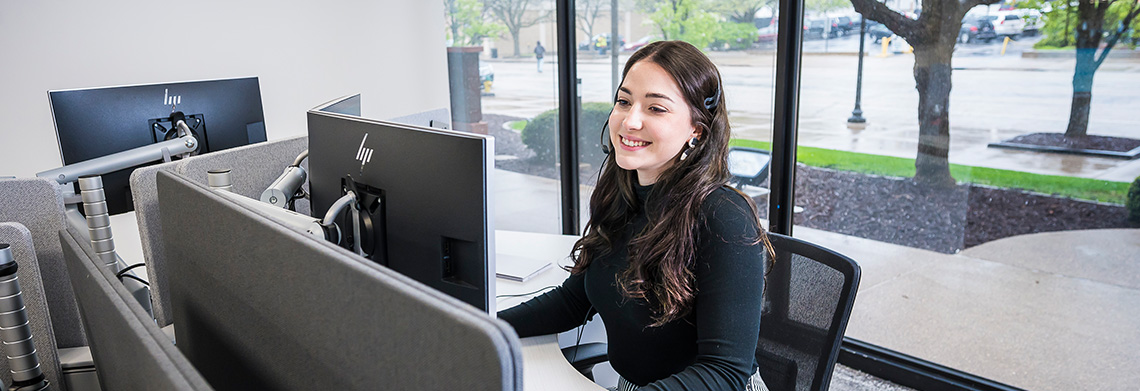

Virtual Hospitalist Coverage Strengthens Rural Hospitals
How five small hospitals improved patient care through after-hours remote support.
Small and rural hospitals provide essential access to health care in the communities they serve. Yet across the country, chronic workforce shortages have proven to be a challenge, particularly with nighttime staffing. Without sufficient resources, this can result in treatment delays, longer patient stays or transfers to a larger hospital. But with additional support, patients can stay close to home while getting the high-quality care they need.
Virtual hospitalist coverage is one proven solution to help small hospitals fill the gaps in provider coverage. OSF OnCall Hospitalist combines people, processes and technology to provide high-quality inpatient care remotely, 365 days a year. Patients benefit from faster treatment and better health outcomes, while providers can grow revenue by serving more patients more effectively. We have confirmed these results within our own health system.
Understanding needs and challenges
OSF HealthCare is an integrated health system owned and operated by The Sisters of the Third Order of St. Francis and headquartered in Peoria, Illinois. We employ over 24,000 Mission Partners in more than 350 locations, including 15 hospitals throughout Illinois and Michigan. Nearly half of our hospitals have fewer than 50 beds. OSF understands the unique needs and challenges of small and rural hospitals — and we have proven solutions to address them.
Five hospitals in the OSF network across West and North-Central Illinois were experiencing challenges with nighttime staffing due to local shortages of nurses and hospitalists. They included:
- OSF HealthCare St. Mary Medical Center in Galesburg (83 beds)
- OSF HealthCare Saint Clare Medical Center in Princeton (25 beds)
- OSF HealthCare Saint Luke Medical Center in Kewanee (25 beds)
- OSF HealthCare Saint Paul Medical Center in Mendota (25 beds)
- OSF HealthCare Holy Family Medical Center in Monmouth (23 beds)
Despite the great benefits small and rural hospitals provide their residents, they are not exempt from the larger issues of today’s health care landscape.
“Within our rural communities, it is becoming more and more difficult to recruit providers to staff 24/7,” explains OSF HealthCare Saint Luke Medical Center President Jackie Kernan, RN, MSN. “Also, the variable census at our critical access hospitals does not make it cost-effective. These reasons drive home the need to look at innovative solutions to care for our patients — so they can live and age in place.
Implementing virtual hospitalists
In order to address these workforce shortages and improve operational flow, OSF OnCall Hospitalist was implemented at each of these five hospitals between 2019 and 2021. Here’s how the service works.
When a new patient is ready for admission, the provider on staff contacts a hospitalist at OSF OnCall, who reviews and admits the patient for treatment. After the patient has been checked in, virtual health technology is brought to their room so the patient and hospitalist can interact with each other. The hospitalist outlines the treatment plan and process, while addressing any questions the patient may have.
The treatment plan and patient data are then entered into the facility’s EMR system, providing a convenient channel for clinical interaction between the hospitalist and the daytime physician. The process streamlines routine procedures as well as communications, allowing on-site staff to provide expedited care to the most acutely ill patients and focus on the most pressing issues at hand.
Results and outcomes
All five rural hospitals have benefited greatly from the support of virtual hospitalists. With the ability to offer 24/7 high-quality acute care, full treatment orders can be implemented early in the process — so patients are more likely to remain on site. This improves patient satisfaction and increases hospital revenue, while less stress and reduced reliance on on-call physicians creates a better work/life balance and increases provider satisfaction.
“OSF OnCall Hospitalist has allowed our patients to be cared for by very connected hospitalists that have a strong connection to our Mission and Vision, close to home,” Kernan says. “Since the implementation of our nocturnal hospitalist service, we have been able to care for more patients, decrease transfers and begin their treatment plan sooner. The ease of use for our nursing teams makes this a valuable resource.”
OSF OnCall Hospitalist includes board-certified physicians available from 7 p.m. to 7 a.m. — with options for daytime staffing. With the support of virtual hospitalists, you’ll see an increase in the efficiency of your physicians and staff. You’ll be able to better manage your limited resources, and your team will be free to help more people. It’s the ideal combination of people, processes and technology.
Give us a call or contact us online to speak with a representative who can answer your questions and help you realize the benefits of virtual hospitalist coverage.
To learn more about OSF OnCall Hospitalist.
Delivering the Future of Health Care Today
Who we are
OSF OnCall Digital Health is an entity within OSF HealthCare leveraging tools, technology and decades of experience to transform today's health care landscape.
This virtual "hospital without walls" platform provides 24/7 access with offerings for partners and patients across the entire care continuum.
What we do
- Urgent Care – treatment for minor illnesses and injuries 24/7/365, both in person and virtually.
- Intensive Care – combining an expert medical staff of critical care doctors and nurses, digital technology, predictive analytics and compassionate care to provide real-time support 24/7/365.
- Hospitalists – digital solutions that provide high-quality inpatient care while improving outcomes and satisfaction and maintaining effective resource stewardship.
- Remote Patient Monitoring – clinical remote monitoring team and tools for patients with chronic conditions such as diabetes, COPD, heart failure, asthma and more 24/7/365.
- Triage – high-quality nurse triage using national evidence-based practice protocol guidelines 24/7/365.
- Physician Office Answering Service – providing after-hours coverage for physician office phone answering services.